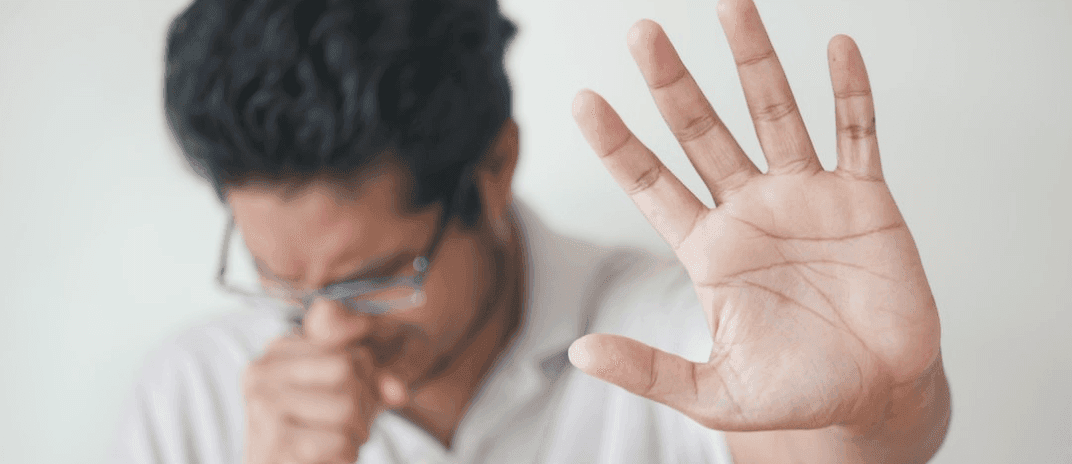


Have you ever experienced getting a sore throat at night all of a sudden? The feeling can be super uncomfortable. Find out the causes and how you can treat them in this article!
Several factors can contribute to a sore throat at night, disrupting peaceful sleep and causing discomfort. From dry air to snoring, all of these can cause stress to the throat muscles. Find out all the potential causes in the following sections below.

Experiencing allergies can contribute to a sore throat at night. Allergies can cause symptoms such as postnasal drip, a runny nose, and a scratchy throat.
When you have an allergy, your body reacts to allergens by producing excess mucus, which can drip down the back of your throat and irritate it.
The nasal congestion and inflammation caused by allergies can also lead to a scratchy throat.
The best solution is to use hypoallergenic pillows and bedding, reducing dust levels in your bedroom, and keeping your home dry and well-ventilated. Antihistamines can also help suppress allergy symptoms and provide relief.
To alleviate the discomfort of a sore throat at night, try addressing the issue of dry air in your sleep environment. Dry air can cause a sore throat by drying out your nasal passages and throat, leading to irritation and discomfort. This is especially common during the winter months when heating systems are running.
If you’re dealing with a sore throat at night, one possible cause could be gastroesophageal reflux disease (GERD). GERD, also known as acid reflux, occurs when the sphincter at the bottom of the esophagus is weak, allowing stomach acid to flow back up. This acid reflux can cause a burning sensation in the chest or back of the throat, leading to throat irritation and pain.
Resting your voice and avoiding activities that strain your throat can help alleviate muscle strain and reduce your nighttime sore throat. Muscle strain occurs when you engage in excessive talking, yelling, singing, or raising your voice for extended periods. These activities can strain the muscles in your throat, leading to soreness by the end of the day.

Epiglottitis, characterized by inflammation and swelling of the epiglottis, is usually caused by a bacterial or viral infection. This condition can result in a severe sore throat and breathing difficulties. Immediate medical attention may be necessary to treat epiglottitis.
To soothe a sore throat caused by epiglottitis, it’s crucial to rest your voice and avoid activities that strain the throat.
Dehydration can lead to dry mouth and throat dryness, which can contribute to a sore throat at night.
It’s important to stay hydrated to maintain proper moisture levels in your throat and prevent discomfort. In addition to drinking water, you can also consume hydrating foods and beverages, such as herbal teas and fruits with high water content.

If you have a sore throat at night, one possible cause could be a viral or bacterial infection. These types of infections can cause intense throat pain and discomfort, often accompanied by other symptoms. Here are three common causes of sore throat at night due to viral or bacterial infections:
– Strep throat: A bacterial infection caused by group A Streptococcus, strep throat can cause intense pain that persists throughout the day and worsens at night. Other symptoms may include difficulty swallowing, swollen tonsils, fever, and swollen lymph nodes.
– Common cold or flu: Viral infections like the common cold or flu can cause nasal congestion, postnasal drip, and throat pain that worsens at night. These infections may also be accompanied by symptoms like cough, fever, and body aches.
– Mononucleosis (mono): Mono is a viral infection that can cause severe throat pain, fatigue, and night sweats. It’s commonly known as the ‘kissing disease’ because it spreads through saliva.
If you’re experiencing a sore throat at night, it’s important to seek medical attention for proper diagnosis and treatment of the underlying infection.
Treating a sore throat involves a combination of home remedies and, if necessary, medical interventions. One of the simplest and most effective remedies is staying hydrated by drinking plenty of fluids, such as warm water with honey and lemon, herbal teas, or soothing broths.
Other solutions include:
In cases where a sore throat is accompanied by other symptoms like fever or persistent pain, consult a healthcare professional for a proper diagnosis and potential prescription medications.
Additionally, maintaining good overall health practices, such as practicing good hand hygiene and avoiding exposure to irritants, contributes to the prevention of sore throats.
No one wants to feel in pain while asleep. Understanding the causes of sore throat at night is crucial for finding effective remedies and improving your sleep quality.
Duke Health (2022) Muscle Tension Dysphonia [online]. https://www.dukehealth.org/treatments/voice-disorders/muscle-tension-dysphonia
Health Direct (2022) Post Nasal Drip [online]. https://www.healthdirect.gov.au/post-nasal-drip#:~:text=Key+facts,usually+involves+treating+the+cause.
Mayo Clinic (2022) Epiglottitis [online]. https://www.mayoclinic.org/diseases-conditions/epiglottitis/symptoms-causes/syc-20372227